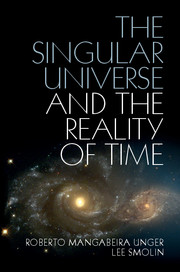Book contents
- Frontmatter
- Contents
- The nature and scope of this work
- Part I Roberto Mangabeira Unger
- Part II Lee Smolin
- 1 Cosmology in crisis
- 2 Principles for a cosmological theory
- 3 The setting: the puzzles of contemporary cosmology
- 4 Hypotheses for a new cosmology
- 5 Mathematics
- 6 Approaches to solving the meta-law dilemma
- 7 Implications of temporal naturalism for the philosophy of mind
- 8 An agenda for science
- 9 Concluding remarks
- Acknowledgments
- References
- A note concerning disagreements between our views
- Index
7 - Implications of temporal naturalism for the philosophy of mind
Published online by Cambridge University Press: 05 December 2014
- Frontmatter
- Contents
- The nature and scope of this work
- Part I Roberto Mangabeira Unger
- Part II Lee Smolin
- 1 Cosmology in crisis
- 2 Principles for a cosmological theory
- 3 The setting: the puzzles of contemporary cosmology
- 4 Hypotheses for a new cosmology
- 5 Mathematics
- 6 Approaches to solving the meta-law dilemma
- 7 Implications of temporal naturalism for the philosophy of mind
- 8 An agenda for science
- 9 Concluding remarks
- Acknowledgments
- References
- A note concerning disagreements between our views
- Index
Summary
In Chapter 1, I introduced the metaphysical folly as the tendency for unreflective naturalists to believe in an imagined nature constructed in their imaginations as being more real than the world we perceive with our senses.
A symptom of the metaphysical folly is the move from Sense impressions give unreliable knowledge of nature, nature is instead truly X to Sense impressions are incompatible with the concept that the world is X, so qualia must not exist. But the one thing we can be sure of is that qualia exist. Therefore, as Galen Strawson [85] and other philosophers of mind [86] emphasize, if we are naturalists and believe everything that exists is part of the natural world then qualia must be also part of the natural world. The right statement – if we are naturalists – must be:
X may provide a good description of some class of observations of the world, but the world cannot be X exactly because qualia are undeniably part of the world and X are not qualia.
Here I would like to argue that it is much easier to conceive of qualia as part of the natural world in temporal naturalism than in timeless naturalism.
- Type
- Chapter
- Information
- The Singular Universe and the Reality of TimeA Proposal in Natural Philosophy, pp. 480 - 483Publisher: Cambridge University PressPrint publication year: 2014



